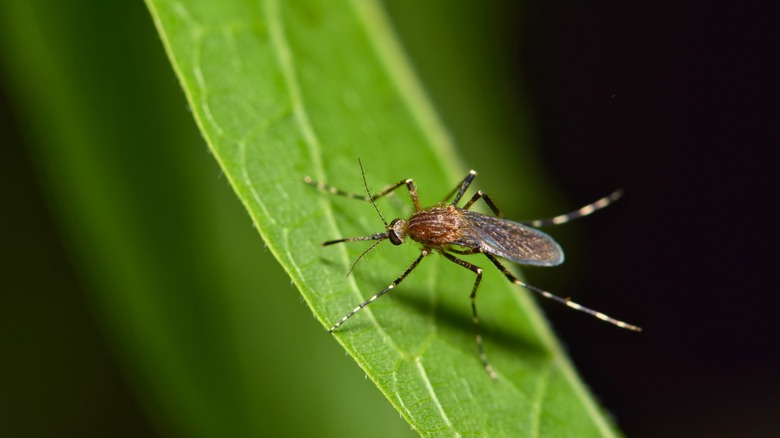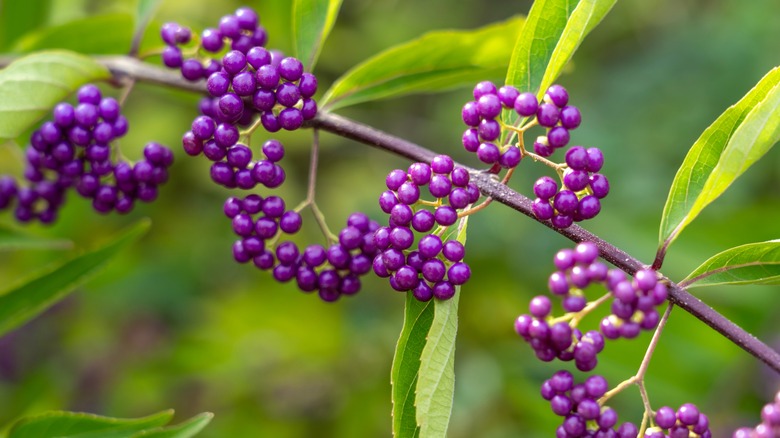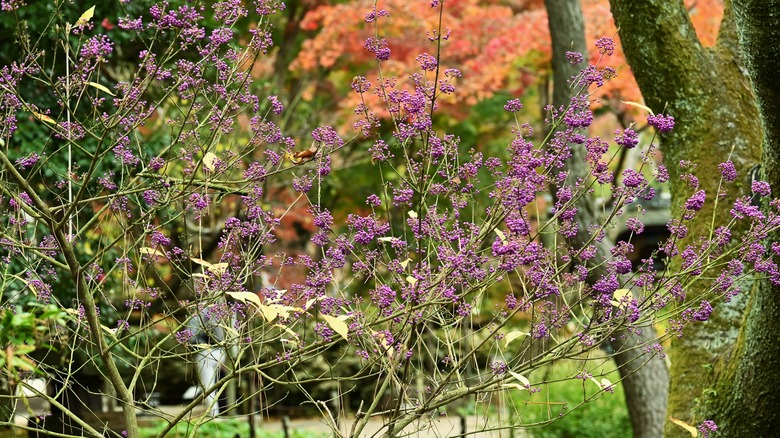Keep Mosquitoes Out Of Your Yard By Growing This Gorgeous Magenta Berry Bush
During the warmer months, it sometimes seems like mosquitoes are out in droves. If your home has a lot of mosquito activity, it's worth looking for ways to eliminate them. Many mosquito-repellent plants work well and can have a big impact on how many mosquitoes you have. For example, if used correctly, Beautyberry can help reduce the number of mosquitoes around your home.
The Beautyberry, or Callicarpa americana, contains compounds that repel mosquitos, including callicarpenal and intermedeol. For best results, you'll need to crush the plant's leaves to release its oils. You can also create a mosquito repellent with the leaves by boiling them or letting them soak in alcohol. Consider growing the plant, crushing the leaves, and placing them in areas where you notice a lot of mosquito activity. By growing this plant in your yard and using the leaves strategically, you can keep your home mosquito-free, prevent itchy mosquito bites, and avoid contracting the harmful diseases they carry.
Added benefits of the Beautyberry
Beautyberry can be a great addition to your yard, but it can do more than just repel mosquitos. It can also keep your yard free from other pests. Beautyberry can help reduce the number of ticks, fire ants, and deer flies in an area by repelling them in a similar way. This bush also does a good job of attracting songbirds to your yard. Since there are many mosquito-eating birds out there, this can help eliminate your mosquito problem even more quickly.
As you would expect from the name, the Beautyberry also has an attractive appearance, making it well worth adding to your yard for aesthetic appeal alone. While the plant's small, pink flowers aren't very impressive, its berries make the bush stand out and can add an interesting splash of color to your landscaping that can increase your home's curb appeal and make your yard feel more comfortable.
Important things to consider before growing Beautyberry
Although Beautyberry can be a useful and attractive addition to your yard, it has the potential to be invasive. Birds and animals commonly spread the plant's seeds, so it could end up growing fast and sprouting up in places other than where you initially planted it. If you want to avoid this risk as much as possible, the safest bet is to stick to growing the Callicarpa americana species of Beautyberry. Unlike C. japonica, which comes from Japan, or C. dichotoma which comes from China, C. americana is native to the Southeast United States.
Like other plants, Beautyberry needs certain conditions to grow well and does best in USDA Zones five to eight. It grows well in just about any soil but is best suited for soil that's loose and well-drained. However, the soil should also remain moist. It's fine to plant Beautyberry in either full sun or partial shade.
There are other plants that you can grow to repel mosquitos as well, so consider opting for them if you prefer not to grow Beautyberry. Although lavender is not native to North America, it's not considered invasive and naturally releases oils that repel mosquitos. Surprisingly, catnip can do a great job of deterring pests as well and is said to be ten times more effective than DEET at repelling mosquitos. However, like Beautyberry, it's still best to use the extracted oils from these plants for the best results.


